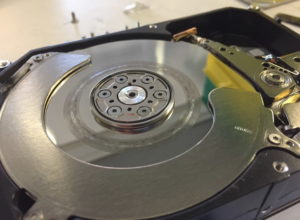 Conventional wisdom holds that a hard drive lasts for about 3-5 years — and most manufacturer warranties tend to support that assumption.
Conventional wisdom holds that a hard drive lasts for about 3-5 years — and most manufacturer warranties tend to support that assumption.
But it’s important to remember that despite precise engineering, hard drives are profoundly sensitive devices. Recently, we’ve seen reports suggesting that hard drive lifespans are “getting worse,” or that most drives fail prior to the 3-year mark.
Neither of these statements are necessarily true. The reports (which we’re not linking here, for reasons that we’ll explain shortly) are based on data with a poor sample size and few controls.
Measurements of hard drive lifespans often use biased data.
For example, the most frequently cited statistics come from BackBlaze, a data backup company (okay, fine, we’ll link to the research). The company’s statistics, while interesting, show how hard drives operate in extremely specific conditions — namely, BackBlaze’s servers.
But in a data center environment, hard drives are subjected to extreme workloads. That’s one of the reasons that companies like Dropbox are often leading the charge to develop new hard drive technologies such as HAMR (Heat Assisted Magnetic Recording).
Reporters often miss this context when reporting on Backblaze statistics. In a typical home computing environment, hard drives aren’t constantly reading and writing data; just as a Ford Focus isn’t a Formula One car, personal computers are not data center servers.
Related: SSD Lifespans: How Long Can You Trust Your Solid-State Drive?
Hard drive failure statistics from data recovery companies are also limited.
Another recent study comes from a major data recovery company. This is, again, interesting data — but not scientific.
To seek data recovery services, a consumer must need the data enough to pay for professional recovery. People who fall into that description are much more likely to be business users, or people who use large amounts of data (such as databases or multimedia) on an everyday basis.
A truly scientific study would need to look at a large quantity of hard drives in a variety of usage environments. Hard drive manufacturers are most capable of performing those studies, and they have a strong incentive to do so: When a device fails inside its warranty period, it must be replaced.
The consumer is also less likely to purchase another hard drive from the same manufacturer — so “planned obsolescence” isn’t really something that happens in the data storage industry.
Various factors can contribute to premature hard drive failure.
Ultimately, we can’t say whether most hard drives fail prior to the 3-year mark. We can say that every hard drive can fail at any time, depending on its operating conditions and various other factors:
- Power surges, static shocks, and other electronic events can damage printed circuit boards (PCBs).
- Hard drives have moving components, and those components can fail due to physical shock or excessive vibration.
- Computers can overheat, particularly if their cooling fans fail or if the user overclocks the CPU without taking appropriate precautions. Excessive heat can damage the data storage media.
- File corruption, ransomware infection, and other non-physical (or logical) issues can also cause data loss.
We recommend purchasing hard drives firsthand from well-known manufacturers. Choose media that meets your needs, and don’t be overly concerned about premature failure.
However, the only way to prevent data loss is to back up your files regularly. For more guidance, read: 6 Data Backup Mistakes That Increase Your Risk of Data Loss.
And if you’ve lost data due to a hard drive failure, we’re here to help. With risk-free media evaluations, full-service laboratories at every location, and our no data, no charge guarantee, Datarecovery.com provides complete peace of mind as your case progresses.
Contact us at 1-800-237-4200 or click here to schedule a free evaluation at one of our facilities.





